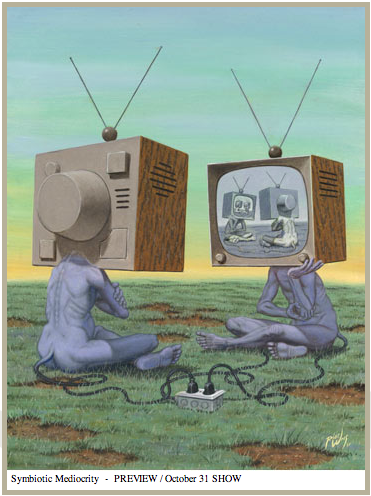I’d like to introduce to you, Eric McLuhan. You guessed it, he is the son of Marshall McLuhan, and yes…as the saying goes: like father, like son. Needless to say, Eric McLuhan has also done his fair share of work on media and technology.
As I read McLuhan2.0’s Electric Language, the notion of technological determinism really seemed to surface. I’ll admit, I never considered this idea before aside from biological, cultural, and economic determinism. But, after my last post regarding our Wall-E world, my head is swimming around trying to make sense of our pixellated matrix world.
McLuhan2.0 pointed out a lot of things. But I’ll try to narrow down to a few observations and thoughts.
- We are living in the age of post literacy yet, there is no such thing as an advanced book – you know, high-tech-gadgety ones. This includes anything read off a computer screen or the TV. McLuhan states that although you may read like you would from print medium, the computer medium possesses qualities of TV. Thus, you may think you are reading, but the method is entirely different. I won’t get into it here, but this idea goes back to Marshall McLuhan and the differences between hot and cold mediums and their effects. So, this leaves me wondering…what about Kobo readers? They seem to be picking up. Would you consider them true reading like a book, or is it McLuhan’s idea of the advanced book? Where are books and print headed? But since my work and focus is around identity, I digress. Interesting to ponder anyhow.
- “The computers and various networks that link us bring about a new condition of massive loss of identity by means of participation in-depth in electronic processes” (p. 4): what?! According to McLuhan, the computer separates us, yet binds us together. By participating socially via the computer, we lose our identity and own being. Our sense of loss thus draw us to groups to belong. This leads to the idea of the disappearance of individualism as McLuhan states that rather instead of an audience watching, we are all participating as actors like a theatre…to no one but our own selves.
- Open crowd vs. closed crowd. The open crowd needs to be everywhere and grow, and can’t be stagnant. The closed crowd has boundaries and limits. Stable. McLuhan places the electric crowd as open. Which poses the question “are you in or out?” BUT!!…The electric crowd is NOT about growing, but of being. To just be. This made me think of a concert for example. Everyone is separate, as their own selves attending the concert and watching. But at the same time everyone is participating together in a shared moment. Online space works like this. Yet the mass audience works similarly, but differently at the same time. In search of one’s own online identity, everyone seems to want to be identified as unique and different, special. A standout above the rest. However, McLuhan posits that everyone is the same in an electric crowd. In a sense, we are nobody. I disagree, as I notice people going to arms lengths to portray themselves better than their neighbour. Or…is it because we are nobodies that compel us to appear better than the rest?
I return to this question from my past post…Does this mean we are living in an existentialist and/or nihilist absurd world?
Eric McLuhan also draws some connections to Plato’s Allegory of the Cave. Dismal and disheartening this may sound, but as I reflect on my last post, we are all living in Plato’s Cave. The computer as the cave. The internet, social media, and information communication technology are the puppets; and we are chained by them and the shadows they create…”The electric crowd lives as if already dead” (148).

